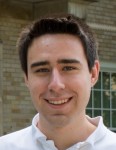Dear Readers
FEATURES
Simple questionnaire predicts unprotected sex, binge drinking
 Valerie Reyna and Evan Wilhelms developed a new questionnaire for predicting who is likely to engage in risky behaviors, including, unprotected sex and binge drinking. Their questionnaire significantly outperforms 14 other gold-standard measures frequently used in economics and psychology.
Valerie Reyna and Evan Wilhelms developed a new questionnaire for predicting who is likely to engage in risky behaviors, including, unprotected sex and binge drinking. Their questionnaire significantly outperforms 14 other gold-standard measures frequently used in economics and psychology.
Study challenges model of Alzheimer's disease progression
 The research of Professor Nathan Spreng and his collaborators sheds light on the basal forebrain region, where the degeneration of neural tissue caused by Alzheimer’s disease appears before cognitive and behavioral symptoms emerge.
The research of Professor Nathan Spreng and his collaborators sheds light on the basal forebrain region, where the degeneration of neural tissue caused by Alzheimer’s disease appears before cognitive and behavioral symptoms emerge.
Social media boosts remembrance of things past
 A new study – the first to look at social media’s effect on memory – suggests posting personal experiences on social media makes those events much easier to recall.
A new study – the first to look at social media’s effect on memory – suggests posting personal experiences on social media makes those events much easier to recall.
Experts Address Elder Financial Abuse as Global Problem
 Financial exploitation of older people by those who should be protecting them results in devastating health, emotional and psychological consequences. International elder abuse experts met at Weill Cornell Medicine to map out a strategy for conducting research on this problem.
Financial exploitation of older people by those who should be protecting them results in devastating health, emotional and psychological consequences. International elder abuse experts met at Weill Cornell Medicine to map out a strategy for conducting research on this problem.
For kids, poverty means psychological deficits as adults
 Childhood poverty can cause significant psychological deficits in adulthood, according to a sweeping new study by Professor Gary Evans. The research, conducted by tracking participants over a 15-year period, is the first to show this damage occurs over time and in a broad range of ways.
Childhood poverty can cause significant psychological deficits in adulthood, according to a sweeping new study by Professor Gary Evans. The research, conducted by tracking participants over a 15-year period, is the first to show this damage occurs over time and in a broad range of ways.
STUDENTS IN THE NEWS
Miss New York Camille Sims fights for social justice
 Camille Sims '15 says fate brought her to Cornell and the Department of Human Development. And now it has propelled her to reign as Miss New York and to finish second runner-up in September's Miss America competition.
Camille Sims '15 says fate brought her to Cornell and the Department of Human Development. And now it has propelled her to reign as Miss New York and to finish second runner-up in September's Miss America competition.
Summer Scholar Spotlight: Brian LaGrant ‘17
 Brian LaGrant ’17, a human development major from New Hartford, N.Y., discusses his research on factors surrounding imitation among children and adults.
Brian LaGrant ’17, a human development major from New Hartford, N.Y., discusses his research on factors surrounding imitation among children and adults.
Risky decisions and concussions
 David Garavito, graduate student in the Law, Psychology, and Human Development Program, under the supervision of Dr. Valerie Reyna, is working with communities in New York and around the country with support from an Engaged Cornell grant for student research. He is working with coaches and student athletes to study the effects of concussions on decision making about risks.
David Garavito, graduate student in the Law, Psychology, and Human Development Program, under the supervision of Dr. Valerie Reyna, is working with communities in New York and around the country with support from an Engaged Cornell grant for student research. He is working with coaches and student athletes to study the effects of concussions on decision making about risks.
ARTICLES ON THE WEB
Alzheimer’s early tell: The language of authors who suffered from dementia has a story for the rest of us
 Adrienne Day writes about how Barbara Lust, professor in Human Development, and other researchers are studying changes in language patterns in early Alzheimer’s disease.
Adrienne Day writes about how Barbara Lust, professor in Human Development, and other researchers are studying changes in language patterns in early Alzheimer’s disease.



